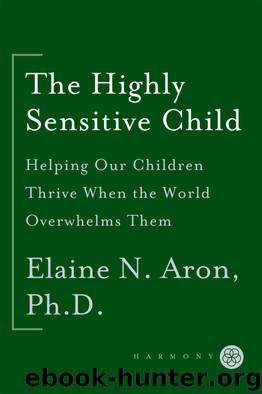The Highly Sensitive Child by Elaine Aron

Author:Elaine Aron
Language: eng
Format: epub
ISBN: 9780767913904
Publisher: Potter/TenSpeed/Harmony
Published: 2002-10-07T16:00:00+00:00
Do Not Underestimate Sensitive Newborns—They Know Your Every Mood; They Learn and Remember
Because we do not remember our own infancy, we tend to assume that newborns will not remember what happens to them and are generally not very aware of what is going on. Nothing could be further from the truth.
Here is a fine example of a newborn’s exquisite awareness. When I left the hospital as a new mother, we went straight to the home of two older friends, a pediatrician and a pediatric nurse who had six children of their own. They had invited us to stay because my husband and I were living rustically in the backwoods of British Columbia at that time, and I had had a cesarean. My doctor did not want me to go back to hauling water and wood too quickly, so he would not release me from the hospital unless I had a more comfortable place to stay temporarily.
The first evening in my friends’ home, I rocked and soothed my HSC in every way I could think of (not many), but he would not stop crying. After a long polite interval, our friend who was the experienced mother and baby nurse asked if she could hold him. The moment she took him into her arms, he stopped crying and his body relaxed. She was doing what I had been doing! But the difference was at a deeper level: Emotionally, she was at ease while I was not.
A newborn’s ability to learn and remember is perhaps even more contrary to our image of passive, unaware newborns until you think about it. Given how much infants need their caregivers to ensure their survival, it makes sense that they would have ways to remember from birth who these people are and how to get along with them. Indeed, using clever experiments and measures of bodily reactions, infants have been shown to have excellent “implicit” memories—the kind of memory that allows both infants and adults to learn lessons and form ideas without being conscious of any of it or having words for it. And since sensitive adults evidence more implicit learning, no doubt sensitive infants do, too.
From these studies of implicit memory, it is clear that newborns recognize and prefer their parents’ voice and face as well as their native language, even when spoken by a stranger. Since newborns do not usually recognize their father’s voice quite as readily, this learning probably starts before birth, in the womb. This ability to learn—for example, to recognize what is familiar and what is new—only increases with age, becoming quite keen by seven months.
Among the most important details for infants to learn are the cues about various emotional states, since these indicate how the caregiver is feeling about the helpless newborn. This is why making and understanding the meaning of facial emotional expressions are a specialty of primates (the “monkeylike” subset of mammals that includes humans). All primates possess muscles attached to the skin of the face and special areas of the brain for detecting subtle expressions.
Download
This site does not store any files on its server. We only index and link to content provided by other sites. Please contact the content providers to delete copyright contents if any and email us, we'll remove relevant links or contents immediately.
Rewire Your Anxious Brain by Catherine M. Pittman(18654)
Talking to Strangers by Malcolm Gladwell(13370)
The Art of Thinking Clearly by Rolf Dobelli(10489)
Mindhunter: Inside the FBI's Elite Serial Crime Unit by John E. Douglas & Mark Olshaker(9343)
Becoming Supernatural by Dr. Joe Dispenza(8217)
Change Your Questions, Change Your Life by Marilee Adams(7783)
Nudge - Improving Decisions about Health, Wealth, and Happiness by Thaler Sunstein(7707)
The Road Less Traveled by M. Scott Peck(7603)
The Lost Art of Listening by Michael P. Nichols(7506)
Mastermind: How to Think Like Sherlock Holmes by Maria Konnikova(7347)
Enlightenment Now: The Case for Reason, Science, Humanism, and Progress by Steven Pinker(7313)
Win Bigly by Scott Adams(7198)
The Way of Zen by Alan W. Watts(6614)
Daring Greatly by Brene Brown(6514)
Big Magic: Creative Living Beyond Fear by Elizabeth Gilbert(5772)
Grit by Angela Duckworth(5615)
Ego Is the Enemy by Ryan Holiday(5450)
Men In Love by Nancy Friday(5240)
The Laws of Human Nature by Robert Greene(5208)
